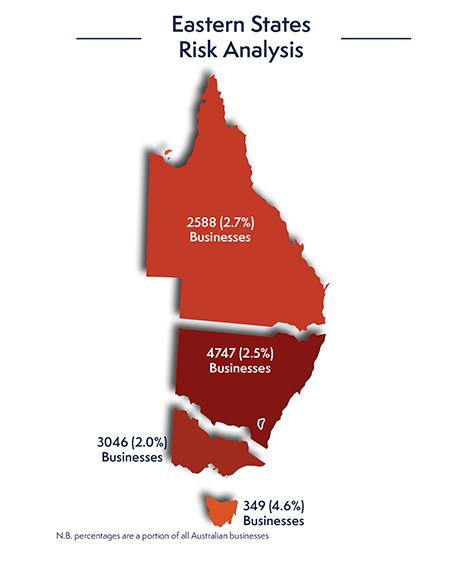New data from one of Australia’s biggest insolvency firms has revealed there are nearly 10,000 small to medium businesses on the brink of collapse, and experts says business strength is unlikely to improve, via SmartCompany.
 The SV Partners Commercial Risk Outlook Report for August 2018 shows there are 9,948 businesses with annual turnover of less than $50 million that are at “high risk” of insolvency in the next 12 months, with political uncertainty and a downturn in property markets pinned as the main contributing factors.
The SV Partners Commercial Risk Outlook Report for August 2018 shows there are 9,948 businesses with annual turnover of less than $50 million that are at “high risk” of insolvency in the next 12 months, with political uncertainty and a downturn in property markets pinned as the main contributing factors.
Those SMEs make up 80% of the total 12,464 businesses the insolvency firm detected as being high risk, with SV Partners managing director Terry van der Velde recommending SMEs have a “rigorous” approach to risk management to try and prevent insolvency where possible.
“SMEs often struggle more with solvency than larger businesses, as their smaller income streams, tighter margins and difficulties sourcing finance can make dealing with short-term shocks more challenging,” van de Velde said in a statement.
“That’s why small and medium-sized business owners need a rigorous approach to risk management, to ensure that their business has a plan to deal with unexpected situations.”
A number of high-profile businesses, particularly in the retail space, have entered administration throughout the end of 2017 and into 2018. These include Toys ‘R’ Us, a selection of Adriano Zumbo’s patisseries, SumoSalad, and Oliver Brown.
Speaking to SmartCompany, Patrick Coghlan, managing director of credit reporting agency CreditorWatch, says there’s definitely been a significant increase in the number of insolvencies for both incorporated and unincorporated businesses.
CreditorWatch’s own research shows the number of unincorporated businesses that have gone from active to inactive between March 2017 to March 2018 is up 60%, suggesting the businesses being hit the hardest are also the smallest.
“We’re seeing people really struggle from a cash flow point of view, and we know from our research that it’s pretty much a 50/50 split between SMEs that are running cash flow positive and those that aren’t,” he says.
Coghlan puts this down to the ever-present issue of payment times, saying a lot of SMEs are still finding it hard to get payments from suppliers on time.
However, he also attributes some insolvencies to a “general softening” of the economy overall.

